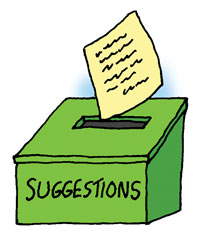For Your Convenience: Worksheets
Changes to Discuss
Your doctor may want to know about any changes in your life since your last appointment. It is useful to consider what you should say before you see the doctor. The list below can help. Of course, all the things on this list won’t apply at every visit! Make a copy of the blank list so you will always have a clean copy to use. Then take a minute to think about each of these possible topics. You may want to jot down when you first noticed each change. You can use the last column to note any additional information that may be helpful for the doctor to know.
| TOPIC | DATE | NOTES |
| Your diet, medication, and lifestyle | | |
| Alcohol use | | |
| Appetite changes | | |
| Diet/nutrition | | |
| Medicines | | |
| Tobacco use | | |
| Weight changes | | |
| Your health | | |
| Bone/joint pain or stiffness | | |
| Bowel problems | | |
| Chest pain | | |
| Feeling dizzy or lightheaded | | |
| Headaches | | |
| Hearing changes | | |
| Losing urine or feeling wet | | |
| Recent hospitalizations or emergencies | | |
| Shortness of breath | | |
| Skin changes | | |
| Vision changes | | |
| Your thoughts and feelings | | |
| Feeling lonely or isolated | | |
| Feeling sad, down, or blue | | |
| Intimacy or sexual activity | | |
| Problems with memory or thinking | | |
| Problems with sleep or changes in sleep patterns | | |
| Everyday living | | |
| Accidents, injuries, or falls | | |
| Advance directives | | |
| Daily activities | | |
| Driving/transportation/mobility | | |
| Exercise | | |
| Living situation | | |
Concerns
At each visit your doctor will likely ask about your concerns. It’s a good idea to think about what you’d like to talk about before the actual visit. This form can help you organize your thoughts. Make a copy of the blank form so you will always have a clean copy to use. Then, after you make an appointment, take a minute to write down the name of the doctor and the appointment details (for example – the date, the time, the address). Use the form to make a list (in order, from most important to least important) of the concerns you want to discuss.
| DOCTOR: | APPT. DATE: | TIME: |
| ADDRESS: | PHONE: |
| APPOINTMENT DETAILS (MOST IMPORTANT TO LEAST IMPORTANT) |
| 1 | |
| 2 | |
| 3 | |
| 4 | |
| 5 | |
| 6 | |
| 7 | |
| 8 | |
NOTES |
Medications
You may be taking many different medicines as well as numerous vitamins and over-thecounter drugs. It can be confusing to keep track of everything! This form can help. Because your medication regimen may change over time, make a copy of the blank form so you will always have a clean copy to use. Try to bring a completed and updated copy of this form to every doctor appointment.
Name of Drug | What It’s For | Date Started | Doctor | Color/Shape | Dose | Instructions |
| | | | | | | |
| | | | | | | |
| | | | | | | |
| | | | | | | |
| | | | | | | |
| | | | | | | |
| | | | | | | |
| | | | | | | |
| | | | | | | |
| | | | | | | |
| | | | | | | |
| | | | | | | |

If you have suggestions to add to future editions of this publication or other ideas for making it more helpful, please contact Freddi Karp, Editor, National Institute on Aging, Office of Communications and Public Liaison, Building 31, Room 5C27, 31 Center Drive MSC 2292, Bethesda, MD 20892-2292; karpf@nia.nih.gov.
<< Back
